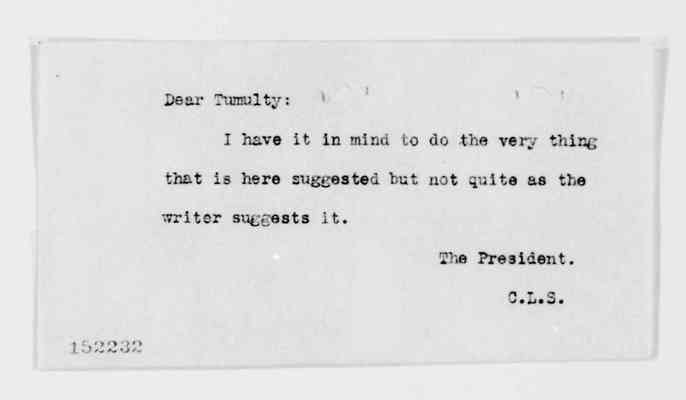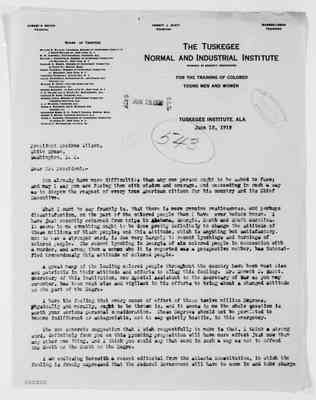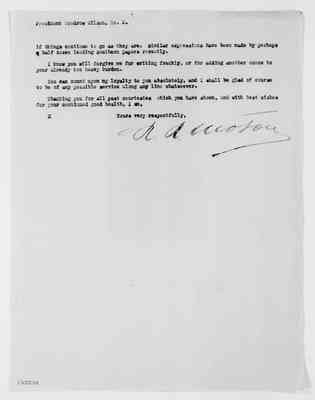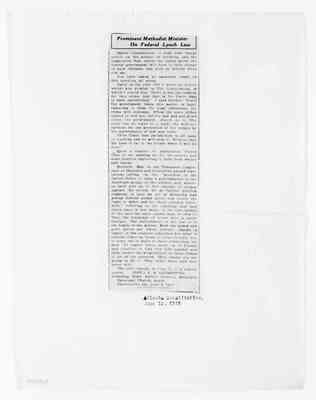Pages
1010
Dear Tumulty:
I have it in mind to do the very thing that is here suggested but not quite as the writer suggests it.
The President.
C.L.S
152232
1011
TUSKEGEE INSTITUTE, ALA.
June 15, 1918
President Woodrow Wilson, White House, Washington, D. C.
Dear Mr. President:-
You already have more difficulties than any one person ought to be asked to face; and may 1 say you are facing them with wisdom and courage, and succeeding in such a way as to deepen the respect of every true Anerican citizen for his country and its Chief Executive.
What I want to say frankly is, that there is more genuine restlessness, and perhaps dissatisfaction, on the part of the colored people than I have ever before known. I have just recently returned from trips in Alabema, Georgia, North and South Carolina. It seems to me something ought to be done pretty definitely to change the attitude of these millions of black people; and this attitude, which is anything but satisfactory, not to use a stronger word, is due very largely to recent lynchings and burnings of colored people. The recent lynching in Georgia of six colored people in connection with a murder, and arong them a woman who it is reported was a prospective mother, has intensified tremendously this attitude of colored people.
A great many of the leading colored people throughout the country have been most wise and patriotie in their attitude and efforts to allay this feeling. Mr. Emmett J. Scott, Secretary of this institution, now special Assistant to the Secretary of War as you may remember, has been most wise and vigilant in his efforts to bring about a changed attitude on the part of the Negro.
I have the feeling that every ounce of effort of these twelve million Negroes, physically and morally, ought to be thrown in, and it seems to me the whole question is worth your serious personal consideration. These Negroes should not be permitted to become indifferent or antagonistic, not to say quietly hostile, in this emergency.
The one concrete suggestion that I wish respectfully to make is that, I think a strong word, definitely from you on this lynching proposition will have more effect just now than any other one thing, and I think you could say that word in such a way as not to offend the South or the North or the Negro.
I am enclosing herewith a recent editorial from the Atlanta Constitution, in which the feeling is freely expressed that the Federal Goverment will have to come in and take charge
152233
1012
President Woodrow Wilson, No. 2.
if things continue to go as they are. Similar expressions have been made by perhaps a half dosen leading Southern papers recently.
I know you will forgive me for writing frankly, or for adding another ounce to your already too heavy burden.
You can count upon my loyalty to you absolutely, and I shall be glad of course to be of any possible service along any line whatsoever.
Thanking you for all past courtesies which you have shown, and with best wishes for your continued good health, I am.
Yours very respectfully, R. R. Moton
152234
1013
DEALING WITH LYNCH LAW
The lynching evil in this country has got to be stopped; and sooner or later it will be, because it is basically incompatible with orderly government and civilization.
It must be stopped by the states or else the federal government will step in and stop it. That much is beyond controvers.
All over the country the conviction is gaining ground that the states themseives cannot put an end to mob violence. In a communication appearing elsewhere upon this page Rev. S. B. Ledbetter, presiding elder of the Dalton district, Methodist Episcopal church, south, and one of the most infiuential and worthy citizens of Georgia, says that it is idle to hope that the state of Georgia will ever stop lynching. "In the very nature of the case," he writes the state cannot hope to stop it," and he gives good grounds for the argument he presents.
"The only remedy as I see it," he declares, "is in the federal courts."
Let us still hope that state action will soive the problem — though developments lend but little encouragement to confidence that it will.
And the outlook is as bad in Illinois as in any southern state — or even worse.
Unless there is a turn for the better the time is not far distant when the federal government will be forced to step in, assert jurisdiction, and do that which the states ought themselves to do without outside interference.
Atlanta Constitution, June 13, 1918
152235
1014
Prominent Methodist Minister On Federal Lynch Law
Editor Constitution: I read your recent article on the subject of lynching, and the suggestion that, unless the states acted, the federal government will have to take charge of such offenses, and wish to indorse what you say.
You have taken no uncertain stand on this question all along.
Early in the year 1917 I wrote an article which, was printed in The Constitution, in which I stated that "there is but one remedy for this crime, and that is for Uncle Sam to have jurisdiction." I said further: "Until the government takes this matter in hand removing it from its local influences, the crime will continue. When the state either cannot or will not enforce law and put down crime, the government should do it. The state has no right to a right she will not exercise for the protection of her people by the maintenance of law and order.
"Give Uncle Sam jurisdiction in all cases of lynching and he will stop it. Without that the time is far in the future when it will be done."
Quite a number of anonymous letters came to me abusing me for the article, and some heartily approving it, both from whites and blacks.
Recently, May 14, the Tennessee Conference of Charities and Correction passed resolutions calling on the "president of the United States to issue a proclamation to the American people on the subject, and, whereas such acts do in fact amount to crimes against the nation, we do further petition congress to pass an act so declaring and giving federal grand juries and courts the right to indict and try those charged therewith referring to the lynching that had taken place in that state. In the very nature of the case the state cannot hope to stop it. Take the lynchings of recent date in south Georgia. The enforcement of the law is in the hands of the whites. Both the grand and petit juries are white, always. Hardly a family in the counties concerned but what is related either by blood or close friendly ties to some one or more of those comprising the mob. To expect juries made up of friends and relatives to find true bills against and then convict the perpetrators of those crimes is out of the question. They simply are not going to do it. They never have, and they never will.
The only remedy, as I see it, is in federal courts (REV.) S. B. LEDBETTER Presiding Elder Dalton District, Methodist Episcopal Church, South Cartersville, Ga, June 9, 1918
Atlanta Constitution June 13, 1918
152236




